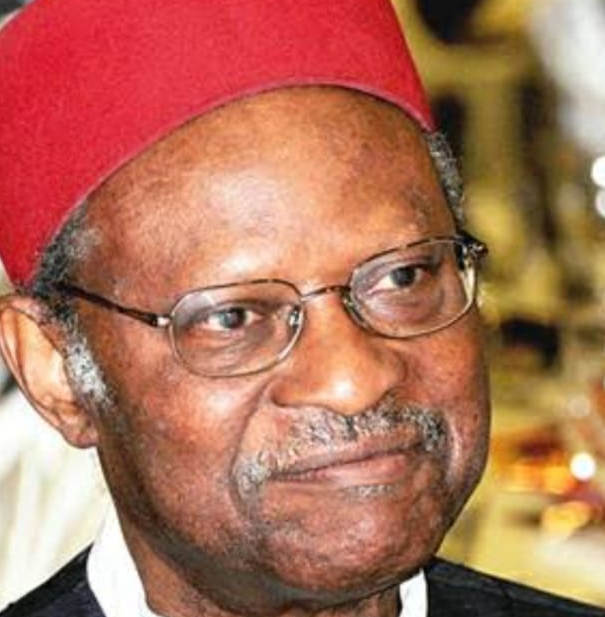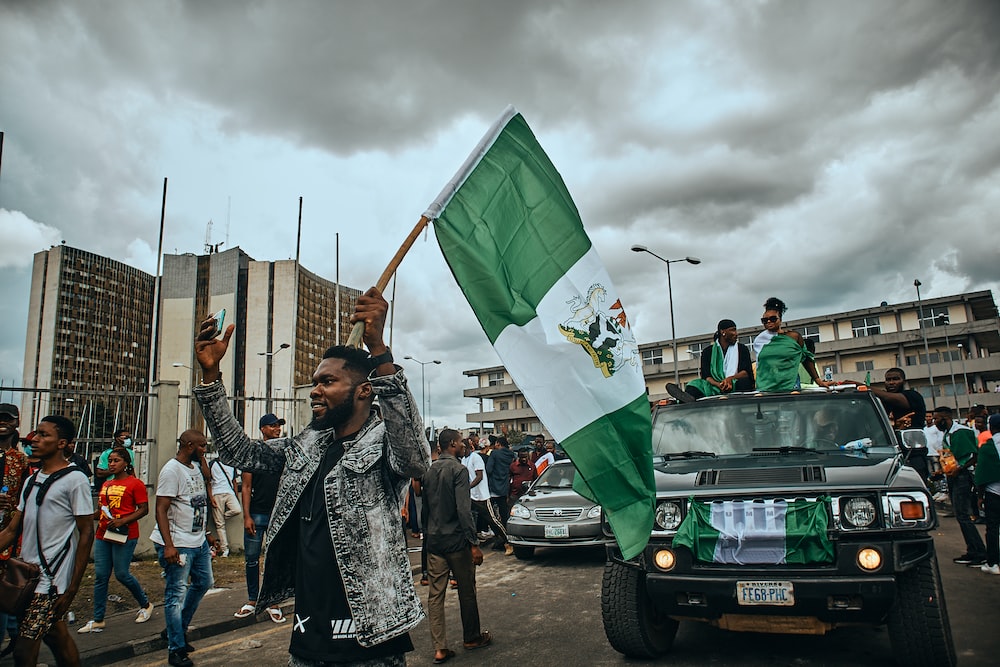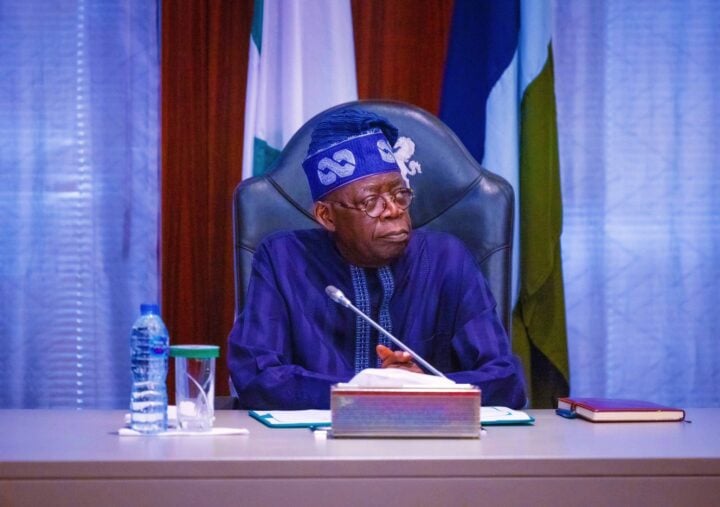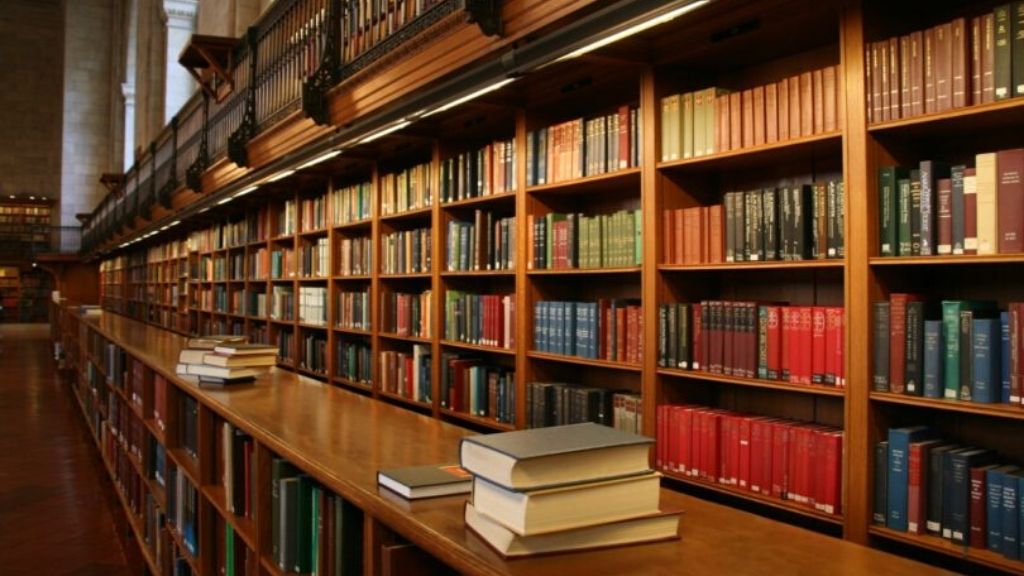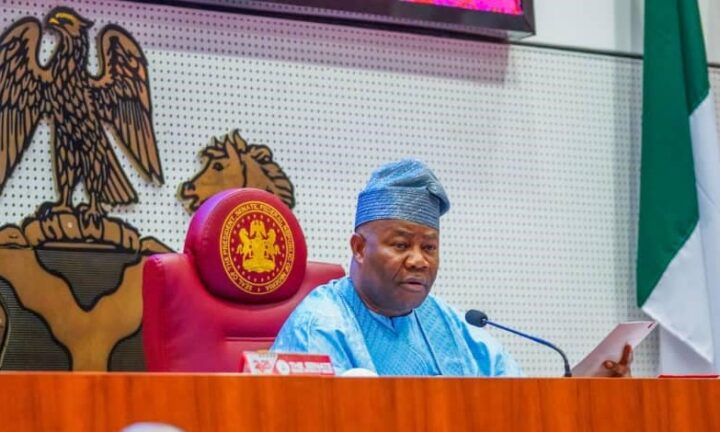It is, indeed, a tremendous pleasure to be back here to give the speech at the 11th Convocation Ceremonies of Afe Babalola University, Ado-Ekiti, this most impressive institution.
I took a tour of the university including its industrial park during my visit last June. I am proud to say that the University is steeped in the tradition of excellence, as envisaged by its founder and chancellor, Aare Afe Babalola.
Chief Babalola is truly a Nigerian iconographic figure. Born into the family of village farmers, he pulled himself up by his bootstraps through sheer hard work, grit, outstanding brilliance and determination to excel regardless of the odds.
He passed his secondary school certificate examination in flying colours as an external candidate, obtained the General Certificate of Education, “Advanced Level”, and graduated from the University of London without seeing the four walls of a university. By the time he celebrated his diamond jubilee at the bar, a celebration that I was privileged to attend, Chief Afe Babalola had become arguably one of Nigeria’s most regarded lawyers.
Advertisement
An author of books, his vision is to make Afe Babalola University someday a rival of Standford University in California. The thirteen-year-old ABUAD has won the award of Times Higher Education as Nigeria’s most impactful university, beating much older universities.
I want to congratulate all of you the students who are graduating at this convocation. As you go out into our country that is currently saddled with the scourge of youth unemployment, I urge you to emulate one of the important personal legacies of the founder of this University which is, to seek self-fulfilment by the dint of your individual initiatives and hard work, always remembering the three key words of your University’s motto: labour, service and integrity.
I have chosen as the theme of this my convocation address The management of diversity: a major challenge to democratic governance in diverse countries. It is a theme that is informed by my over thirty-four years of working closely with the governments of the 54, now 56, member countries of the Commonwealth of nations that are located in all the major continents of the world. And I believe that the theme is very relevant to the current situation in our own country, Nigeria.
Advertisement
I must begin with a definition of a diverse country in the context of my presentation. A diverse country is a country where the main component groups of the population consist of people who belong to different cultures, religions, ethnicities or race, and in some cases have different historical beginnings.
To give examples, some diverse countries are relatively recent amalgams of their component parts such as Nigeria in 1914, Yugoslavia in 1918, and Czechoslovakia in 1918; others have longer histories of their component parts coming together to form their countries such as India 5000 to 6000 years ago, Sudan some 3000 years ago, Switzerland in 1815, The United Kingdom in 1707, and Canada in 1867.
In all diverse countries, there have been, and/or are continuing efforts to manage their diversity. The efforts have largely taken two complementary forms: through structuring a national constitution that specifically addresses the diversity, and through pursuing governance policies that deal with the problems arising from the diverse populations of the countries concerned.
In some cases the efforts have succeeded like in India, the United Kingdom and Canada; in other cases the efforts have failed like in Yugoslavia, Czechoslovakia, and Sudan; while in other cases the efforts are continuing as work in progress like in Turkey, in the countries of the Balkan region in Europe, and in Nigeria.
Advertisement
Let me now give some examples of successful and unsuccessful efforts to manage diversity.
One successful effort is Switzerland; a small landlocked and mountainous European country of only 8.7m people, which by its constitution has 26 cantons because of the pluralistic composition of its population. It has four official languages, namely, Italian, German, French, and Romansh. Switzerland officially is a successful confederation.
Another example is Belgium, a European country which grappled with its diversity, as it is composed of French, German, and Flemish-speaking citizens. Belgium is divided into major cultural groups, namely, the Flemish in the north and the Wallonians in the south, with the cosmopolitan Brussels as the capital. Belgium itself grew out of the Netherlands in 1830 over religious denominational differences. While Holland remained mainly Protestant, Belgium is mainly Catholic.
Religious differences have been a major factor in the instability of some countries. In Lebanon for example, government offices are shared along Christian (Maronite), Shiite and Sunni lines. These polarising lines extend to the recruitment of even civil servants and security officers.
Advertisement
There are instances in recent history where religious differences have culminated in the emergence of new nation-states. The country of East Timor was separated from Indonesia in 2002 principally because it is predominantly Christian, while Indonesia is not only Muslim-dominated but also the largest Muslim nation in the world. Also, Pakistan separated from India as the latter was about to gain independence in 1947 because it is a Muslim territory while India is predominantly Hindu.
Even among nations with one dominant religion, sectarian differences have also resulted in severe conflicts and wars, sometimes leading to the emergence of new countries. An example of this was Yugoslavia which has broken into eight countries, including Serbia, whose people belong predominantly to the Orthodox Church, and Croatia, whose most citizens confess what is known as Western-rite Christianity.
Advertisement
Again at the bottom of the Irish-British relations is the religious difference. While Ireland has historically been fiercely Catholic, the United Kingdom is the home of the protestant Anglican Church.
Let me now speak about the use of government policy to address the challenge of diversity. And here, I want to recall one particular example that I personally witnessed. In 1968, Canada was confronted with a serious political crisis, the threat of secession by its large French-speaking province of Quebec. The then French President General Charles de Gaulle had during a state visit to Canada in July 1967, stoked the fire of the secessionist movement in a speech in the city of Quebec in which he had declared Vive le Quebec, Vive le Quebec libre (Long live Quebec, Long live free Quebec).
Advertisement
I accompanied the first Commonwealth Secretary-General, Arnold Smith himself a Canadian citizen who was much concerned about the crisis on a visit to the founder and leader of the secessionist party, Parti Quebecois, Monsieur Rene Levesque. The then Canadian Prime Minister, Lester B Pearson an English-speaking Canadian who was leader of the governing political party was about to retire.
In a visionary political act, Lester Pearson bypassed all his senior colleagues in the Liberal Party and supported as his successor a young French-speaking junior member of his government, Pierre Trudeau whose parliamentary experience at the time was only 3 years and ministerial experience only 18 months. This act arrested the secessionist movement in Quebec and saved Canada from disintegration. I am sure that many Canadians today would readily agree that Pierre Trudeau’s premiership cemented the unity of the Canadian nation.
Advertisement
Coming nearer home, Nigeria’s neighbour on the eastern flank, Cameroon, has since September, 2017, been fighting an under-reported armed conflict arising from its diversity. The Anglophone separatists have been at war with their Francophone compatriots whom they accuse of absolutely marginalizing them in the national scheme of things.
I now come to our own country, Nigeria, which is a diverse country whose main component parts had lived separately for centuries in their respective areas with their different cultures. Given the nature and geography of its component parts Nigeria, we must admit, is a good example of what the late eminent Harvard political science professor, Samuel P. Huntington, called a cleft society in his 1993 magnum opus, The Clash of Civilisations and the Remaking of World Order.
It is an undeniable fact that Nigeria’s diversity was more successfully managed in the early years of the country’s independence. During that period, Nigeria’s diversity was perceived by all as a source of strength and inspirer of national unity. There were no inter-regional tensions, and in the perception and conduct of its citizens the country had begun to evolve into a nation that was credibly aspiring to realize its huge potentials. But all this changed when the military intervened in the country’s governance in January 1966 and changed the existing constitution.
Under the Constitution of fewer and more viable federating units that we had before the military intervention, there was security of life and property, and there was a faster pace of economic development in the regions.
During that halcyon period, the regional premiers and federal government officers were utilizing their limited resources more efficiently and effectively. Revenues from cocoa produce were used by the Premier Chief Obafemi Awolowo for landmark projects and programmes including free education in the Western region. Revenues from palm produce were utilized by Premier Dr Michael Okpara to build industries, finance education and develop agriculture in the Eastern region. In the Midwest region, Premier Chief Denis Osadebay expanded the region’s economy with revenues from rubber, timber, and palm produce. And in the Northern region, the Premier Sir Ahmadu Bello used money from the region’s groundnut pyramids, hides and skin and cotton exports to build industries in Kano, Kaduna, and elsewhere.
The regions also engaged in healthy competition which facilitated rapid development across the country. When the Eastern Nigerian Government built Nigeria’s first autonomous university in Nsukka in 1960, the Western Region followed by establishing the University of Ife at Ile- Ife in 1962, and the Northern Region built Ahmadu Bello University at Zaria, also in 1962.
The national stability and fast pace of economic growth won Nigeria respect and admiration across the globe. A Nigerian, Brigadier, Thomas Aguiyi-Ironsi, was chosen by the UN Secretary-General as the first African to lead the United Nations Peacekeeping Force in the Congo. The Nigerian ambassador to the UN, Chief Simeon Adebo, and his counterparts from Japan and India saved the global body from a major crisis in 1964 over the invocation of Article 22 of the Charter in a dispute between the Western and Eastern blocs. Needless to add, that Nigeria’s green travel passport was universally respected during this period.
In contrast today if truth be told, the situation inside our country is lamentable. There is unprecedented level of divisiveness and declining sense of national unity, the economy is in doldrums with 133 million of our population in multidimensional poverty, there is great insecurity throughout the land as we hear everyday of killings and kidnappings by unknown gun-men and marauding bandits, all our infrastructure including power supply, roads and educational and health facilities are in poor state. Added to all this, there is complete bastardization of our societal ethical values, and an unfathomable level of corruption evident in the often reported massive looting and mismanagement of the country’s resources including the continuing unbridled theft of our crude oil.
And abroad, it is not just the individual Nigerian citizens holding our national passport who are disrespected and often humiliated at airports and elsewhere, but also the country and its government. For example, African countries like Egypt and Ethiopia whose economies are considerably less than Nigeria’s were invited to join the BRICS at the group’s recent summit meeting in South Africa but not our country.
However, even in the midst of the depressing picture that I have painted, I believe that Nigeria is still salvageable. The country can still be restored to greater peace, greater security, to a renewed sense of national unity, to greater political stability, and to a more assured pace of economic development. As we all know, there is abundance of expert analyses and prescriptions of how to resolve Nigeria’s individual problems.
But the crux of my submission is that, considering our history over the last 63 years, to arrest the ongoing deterioration of the situation in the country, and to achieve the desired transformation for the better, we need a system of government that not only addresses our diversity, but is also based on a Constitution that can correctly be described as a Nigerian people’s Constitution.
Accordingly, I call on the Presidency in consultation with the National Assembly, instead of continuing to tinker with the 1999 Constitution, to acknowledge the urgent necessity of a new Constitution to be made by the people of Nigeria. To this end, I invite Federal Government to immediately embark on the following practical steps.
First, convene a national Constituent Assembly of directly elected on a non-party basis representatives whose task would be to discuss and agree a new Constitution for the Federal Republic of Nigeria taking into account the 1963 and the 1999 Constitutions as well as the recommendations of the 2014 national conference.
The elected representatives should number 362 with 10 each from the existing 36 States and 2 from the FCT, and they should be assisted by 37 Lawyers drawn one each from the 36 States and the FCT.
The management of the work of the Constituent Assembly should be entrusted to a six-member Steering Committee of equal individual powers (possibly the 2 co-chairmen, 2 vice-cochairmen,2 joint-secretaries) elected from each of the six geopolitical zones by members of the Assembly themselves.
The Constituent Assembly should be given 6 months to produce the draft new Constitution.
The agreed draft Constitution should be put to a national referendum for adoption by a majority of the voters, after which it should be signed by the President.
In my view, the essence of the new Constitution should, in recognition of the crucial principle of subsidiarity in every successful federation, involve a devolution of powers from the Central government to fewer and more viable federating units with strong provisions for inclusive governance at the Centre and in the Regions as was agreed by Nigeria’s founding fathers..
In ending my remarks, I want to call attention to the need for our country stopping to punch below its weight in the global arena. As the largest black nation on earth, our country would need always to act in cognizance of its manifest destiny. I would recommend that after putting our domestic situation right, the Presidency and the Ministry of Foreign Affairs should work especially hard to elevate Nigeria’s standing within the comity of nations, and that the citizens by their behaviour should join in earning for the country a deserving international reputation as well as membership of appropriate global organizations.
In conclusion, I would like to stress my belief that properly managed, Nigeria’s diversity will become an asset and not a liability, and thus prove that Nigeria is a tapestry, a beautiful mosaic, and above all, a miracle waiting to happen.
Anyaoku, secretary-general of the Commonwealth from 1990 to 2000 and briefly Nigeria’s minster of foreign affairs in 1983, delivered this address at the 11th convocation ceremonies of Afe Babalola University, Ado-Ekiti, on Friday, October 20, 2023.
Views expressed by contributors are strictly personal and not of TheCable.
Add a comment
